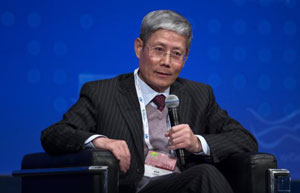Monopoly break-up to shore up economy
By Xin Zhiming (chinadaily.com.cn) Updated: 2014-04-24 14:12In the latest move to boost its mediocre economic growth, China has decided to launch 80 new pilot projects, ranging from including transport infrastructure, oil and gas pipelines to renewable energy and coal mining.
It is part of the country's moderte mini-stimulus plan, which aims to shore up the slowing economy while avoiding thwarting its efforts to shake off its over-dependence on investment.
This is the second time in a month that policymakers have decided to resort to increasing investment in
|
 New urbanization plan ambitious: Analysts
|
|
 |
Unlike in the past, the policymakers have made it clear that private investment would be encouraged to enter those sectors, a stance that testifies to their reform-oriented mentality.
The Chinese economy has galloped at a fast pace — almost 10 percent annually — in the past three decades and amassed a string of problems, such as overcapacity and lop-sided reliance on the State sectors.
To unleash new growth potentials, the country urgently needs to tap the potentials of the private sector, which has contributed to most of the world's second-largest economy's output and job creation.
This is not the first time that China has vowed to better bring out the role of the private investors. In 2005, it released the landmark policy supporting the development of private economy dubbed "36 Non-State Clauses". A slew of policies have ensued in the following years to clear the hurdled for growth of the private sector.
The step of reform, however, has proven slow and undershot expectations of private investors. In particular, they have been largely kept away from those key monopolistic sectors, such as oil and electricity.
The State Council, led by reform-minded Premier Li Keqiang, has been trying to accelerate its step in opening up those sectors to provide new growth engines for the national economy.
In Wednesday's State Council executive meeting, participants have reached consensus that government red tape would be eliminated to simplify procedures for private investment. Relevant laws and regulations would be reviewed so that they would not be in the way of investors entering those monopolistic sectors. Fair market regulation, which means equal treatment to market players, whether they are State-owned or private, would also be strengthened, according to the meeting.
It is in line with the country's latest platform of making the market play a decisive role. It is also a sign that the country's administrative reform is stepping in the right direction, one that treats all types of market players equally, which has proven — whether in China's short history of market economy build-up or the mature Western market economies — the most efficient way of optimizing resource allocation and promoting long-term economic vitality.
No doubt, such a reform would touch on the core interest of some powerful businesses and interest groups and, therefore, will be an uphill battle.
But the central government, led by Premier Li, has shown its unequivocal resolve of reform after it was sworn in early last year. A top priority of Premier Li's governance philosophy, for example, has been streamlining of administrative power after he took office, although he acknowledged that the task of shaking up vested interests in reforms is more difficult than "touching the soul".
The Chinese economy has entered a new cycle of growth, which features slower growth rates. It needs more than ever the input of "reform dividends" to provide a long-term driving force, something the break-up of monopoly will deliver.

















